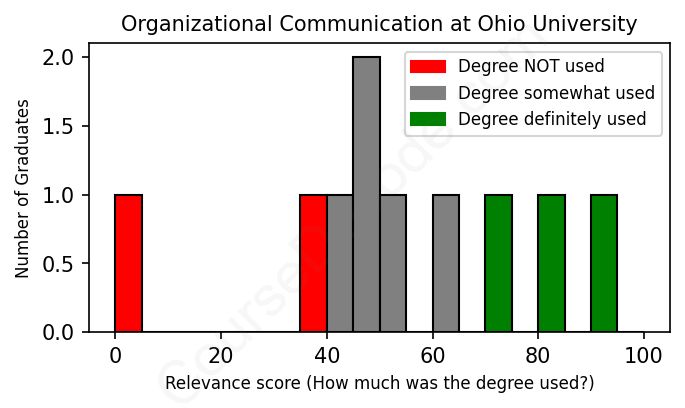
First, some facts. Of the Organizational Communication graduates from Ohio University we've analyzed , here's how many have used (or NOT used) their degree in their career:

These are estimates based on AI analysis of 10 LinkedIn profiles (see below).
The verdict? Significantly below average. Overall, with an average relevance score of 53%, Organizational Communication graduates from Ohio University have a much lower likelihood (-14%) of finding work in this field compared to the average graduate across all fields:
And for comparison, here's the chart for all profiles we've looked at across all degrees.
Also, after graduating, only 30% of these graduates have pursued further education other than another Bachelor's degree (such as a Masters degree or other), compared to the average across all profiles of 35%. This suggests a Bachelors degree is enough for most Organizational Communication graduates, and it's normal to look for work straight after graduation.
See the details:
|
Relevance score: 50% We think this person has gone into a career only somewhat relevant to their degree. We think this person has gone into a career only somewhat relevant to their degree.
DEGREE INFOGraduated in 2018 from Ohio University with a Bachelor's degree in Communication Studies in Organizational Communication. No other secondary education since. JOB HISTORY SINCE GRADUATIONHead Bartender Studio 35 Cinema & Drafthouse Nov 2019 - Present ABOUTI am excited about opening up a new chapter of life involving my career. Working in the service industry for almost 10 years has been very rewarding but curious about what else is out there. I am very open minded about a new work environment and work load. I view myself as a highly-driven and highly-motivated individual that is successful at responding to ever changing situations. Able to lead, motivate, and learn with diverse teams and team members while serving as an individual as well. I feel I have always been passionate about working with people and fast-paced environments. Looking for a comfortable work environment that challenges me to grow knowledge and motivation to becoming the best me I can be. |
The top 10 most common jobs done by the graduates we've analyzed (ranked most common to least) are:
When looking at the careers of people who graduated with a degree in Organizational Communication from Ohio University, it's clear that a mixed bag of job types emerges. Many grads ended up in roles like Account Executives, Managers, or Marketing Coordinators. These positions often require communication skills, but not all of them directly apply the specific knowledge that comes with an Organizational Communication degree. For example, while a role as a Brand Manager at Sherwin-Williams utilizes many of the principles learned in school, a position like a Loan Officer primarily focuses on financial processes where organizational communication isn’t as crucial.
Overall, it appears that while some grads found jobs directly tied to their degree, others ventured into roles that only tangentially related to organizational communication. Many of the jobs involve some basic communication or interpersonal skills, but they don’t always engage with the deeper theories or strategies taught in the program. So, while Organizational Communication graduates certainly have a variety of job options, the path isn’t always a straight line to roles that fully leverage their education.
Here is a visual representation of the most common words in job titles for Organizational Communication graduates (this is across all Organizational Communication graduates we've analyzed, not just those who went to Ohio University):

When looking at the career trajectories of graduates from Ohio University with a degree in Organizational Communication, there’s quite a mixed bag. Right after graduation, many seem to start in roles that are somewhat tangential to communication, like customer relations or sales positions. For instance, several graduates landed jobs in customer service at financial institutions or in marketing assistant roles. Others took on positions in arts organizations or education, which, while related to communication, might not fully utilize their degree right away. So, their first jobs can vary from communications assistants to loan officers, showing a blend of industry applications.
Fast forward five to ten years, and you start seeing a clearer picture of individuals carving out relevant roles in communication and management. Some graduates shift toward roles like brand management or more strategic positions in marketing, which align well with their studies. Others end up in HR, consulting, or even education, indicating diverse pathways that still connect back to their foundational knowledge in communication. While not everyone sticks strictly to communication-specific roles, many manage to leverage their skills in various professional capacities, pointing toward an adaptable and helpful skill set built during their time at Ohio University.
Getting a Bachelor’s degree in Organizational Communication at Ohio University is generally on the more manageable side compared to some other majors. You’ll dive into subjects like communication theory, group dynamics, and even some fun stuff about how to effectively work in teams. While you’ll definitely have to put in your fair share of effort, especially with project work and presentations, most students find the courses engaging and the material pretty relatable. It’s not a walk in the park, but if you enjoy interacting with people and understanding how organizations tick, you might find it easier than many other degrees. Plus, the supportive faculty helps make the experience smoother!
Most commonly, in the LinkedIn profiles we've looked at, it takes people 4 years to finish a Bachelor degree in Organizational Communication.
Looking at these Ohio University grads and their job histories, it seems like some are doing pretty well, while others might be scraping by a bit more. The ones who landed roles like Senior Brand Manager and Loan Officer probably have decent salaries, likely in the upper range for their fields, especially as they gained experience. On the flip side, some folks are bouncing around in entry-level or part-time jobs, like bar tending and temporary teaching roles. These positions typically don't pay as much, so they might not be making the big bucks. Overall, it seems like there’s a mix of financial success across the board, with a few shining stars that have probably managed to secure a comfy paycheck, while others might not be living the high life just yet.
Here is a visual representation of the most common words seen in the "about" section of LinkedIn profiles who have a Bachelor degree in Organizational Communication (this is across all Organizational Communication graduates we've analyzed, not just those who went to Ohio University). This may or may not be useful:

Here are all colleges offering a Bachelor degree in Organizational Communication (ordered by the average relevance score of their Organizational Communication graduates, best to worst) where we have analyzed at least 10 of their graduates:
| College | Score | Count |
|---|---|---|
 Middle Tennessee State University Middle Tennessee State University
|
68 | 10 |
 Middle Tennessee State University (MTSU) Middle Tennessee State University (MTSU)
|
55 | 10 |
 Ohio University Ohio University
|
53 | 10 |